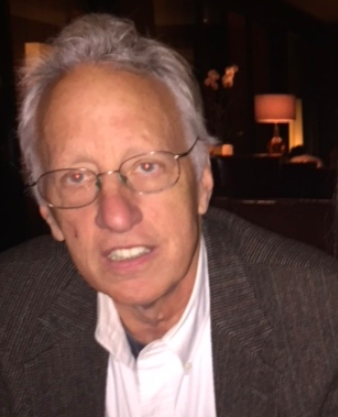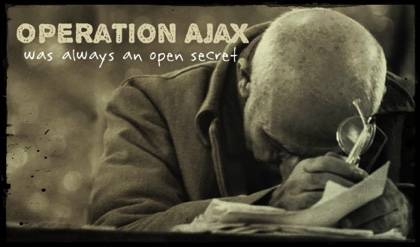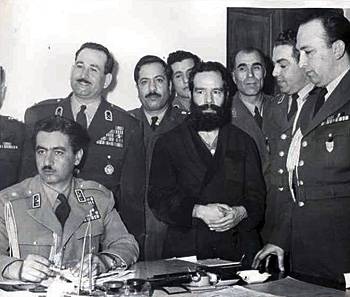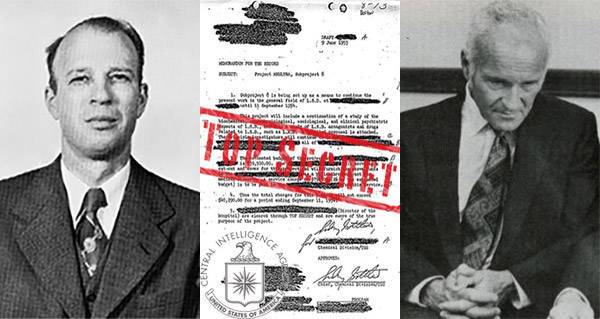I cannot and will not recant anything, for to go against conscience is neither right nor safe. Here I stand, I can do no other, so help me God. Amen.
-Martin Luther
The year 1953 remains a most decisive year in the Iranian psyche.
It is the year the coup d’état took place that changed Iran’s course of history. It is when two imperial powers, one declining, the other rising, decided to bring down the democratically elected government of Dr. Mohammad Mossadegh.
The operation became known as Operation Ajax.
It was a year of living dangerously.
Earlier that year, another tragedy had happened. This time in the U.S. It began at a resort near Washington, D.C., Deep Creek Lake, and then a few days later on the pavement of New York city near Penn Station.
A man, a scientist and a CIA employee, fell to his death from the 13th floor of the Statler Hotel. The official conclusion was that it was a suicide. That is what the family of Dr. Frank Olson was told. No details.
Frank Olson was 43 years old and left behind a wife and three small kids.
Years later, almost two decades after this horrific incident, the Church Committee, concluded that Frank Olson had been given LSD in his drink without his knowledge by other CIA agents and that he had committed suicide.
The family had always believed that their beloved father and husband had committed suicide on his own. The LSD portion had never been included in the story. But now there was a new version.
It was the government’s version. Yes, LSD was administered without his knowledge. He had gone into a psychotic mode as a result. But again, it was not the whole truth.
The family, after finding out that he died under mysterious circumstances, decided to sue. But the Ford Administration asked them to come to the White House and offered them a public apology and a settlement of 750K.
Gerald Ford had been advised by his two chiefs of staff, Dick Cheney and Donald Rumsfeld.
Of course, that was meant to stop any further inquiries into Frank Olson’s death.
Eric Olson, his eldest son, never believed the story. The story, in fact, had many more twists and turns.

Now a suspense documentary on Netflix, “Wormwood,” directed by the Oscar nominated Errol Morris, released on Dec. 15 2017, tells the whole story.
Frank Olson did not fall to his death by accident or committed suicide. He was murdered by the same people whom he worked for: The Central Intelligence Agency.
It was a well orchestrated affair.
A scientist by training, Dr. Olson worked at Fort Detrick in Frederick, MD, which from 1943-1969 was the center of the US biological weapons program. He was in charge of the biochemical department, which experimented on monkeys. According to his wife, Alice, her husband became progressively more disturbed at the sight of monkeys dying. He also witnessed the interrogation and the death of prisoners in secret prisons in Europe whom the CIA experimented on with LSD and other chemicals. After the Deep Creek incident he was not the same person so he asked to be terminated. He had long thought about leaving his job. He had even told his wife.
Well, that was not to be the case. He was not terminated but eliminated.
He was too much of a risk for he might spill the beans about the secret MK Ultra project of the CIA which was created under its then director Allen Dulles. This program had one thing in mind: To create biological germs and other chemicals to use against the enemies of the United States. It was allegedly used against the North Koreans during the Korean war.
A shady character, Sidney Gottlieb, a “brilliant” scientist at the CIA who was featured in the movie “The Men Who Stare at Goats,” was in charge of the program. He was the one who administered the LSD to Frank Olson in that fateful night at Deep Creek Lake. They all had laughed at him when he had a bad reaction, he had told his wife.
It was Gottlieb who some years later suggested killing the Congolese leader and elected PM Patrice Lumumba by lacing his toothpaste with poison. There were other cases as well.
It was about the Cold War but it was also about greed.
Years later, when the family visited Gottlieb at his farm in VA, he told them that he was a different person. So much for that. Now he was tending to goats and had become an environmentalist!
The people involved in Frank Olson’s death or the coup in Iran never ever paid for the crimes they committed. Most lived a good and long life and died in peace. I suppose some not in peace.
This was not the case for Frank Olson’s family. Alice became an alcoholic, though she recovered. The daughter and her husband and child died in an airplane crash. Eric and his brother Niels pursued their quest for the truth. Eric, relentlessly.
Eric never gave up and never accepted the fake story. He has lived his entire life to find out the truth about his father’s untimely death. According to him and the investigation that pursued the case, his father did not commit suicide. He did not fall nor did he just go through the window of room 1018A on his own. He was given a blow to the head and was thrown out of the window.
He was killed at around 2:30 a.m.
“The truth shall set you free” reads the inscription in the entrance hall of the CIA.
Really?
The Truth has set Eric free finally, perhaps, but the CIA never told the truth and likely never will. Frank Olson’s dossier is kept in a secret vault in Langley, VA.

They killed one of their own for they considered him a dissident, a threat to national security.
Frank Olson died in November 1953. Mossadegh’s government fell in August of that year.
Mossadegh was toppled and lies were told. The aspirations of a nation were thwarted. The Olson family lost their father and their future in many ways. How can a family ever survive the death of their father or their husband especially if all your life the truth is kept away especially by your own government?
Many families’ lives were changed forever in Iran during and after the coup of 1953. The Prime Minister was put on trial for “treason”, sentenced to two years in prison and then exiled to his estate for the rest of his life. No one was allowed to visit him except his immediate family and his personal attorney ( my late father). Dr. Fatemi, Mossadegh’s foreign minister and the one who initially suggested the oil nationalization, was stabbed and then executed by the Shah’s regime. He had fever from his wounds yet was taken to the gallows. Mossadegh’s head of the National Police, Afshartoos, was kidnapped and his body was found later.

After the Coup, many others ended up in jail including my own father.
Gottlieb was given the medal of honor. Frank Olson’s boss got promoted. Sha’aban the brainless, one of the thugs involved in the Coup was given a Cadillac and welcomed at the Court and praised for his role. General Zahedi, a one-time Nazi sympathizer and one of the coup organizers, became the Prime Minister.
Kermit Roosevelt got good deals in the oil industry.
Richard Helms who once directed the CIA and had eliminated all the files regarding CIA’s illegal operations became Ambassador to Tehran.
Dick Cheney and Donald Rumsfeld became Vice President and Defense Secretary under G.W. Bush. America went to war again, this time in Iraq.
Dr. Mossadegh had stood up to the almighty powers. He had to be dealt with.
Frank Olson, too, challenged the powers that be and lost his life. He knew too much.
************
In 1995, Eric Olson started a website that contains articles and references to Frank Olson’s life and death. It is in many ways a tribute to his father’s legacy.
http://www.frankolsonproject.
The site “is dedicated to exploring those circumstances and the political and ethical issues embedded in them – issues of paramount importance to the maintenance of an open democratic society.”
Eric, who received his PhD at Harvard in psychology, graciously agreed to give me an interview. Here is the full text:
The series on Netflix which was released on December 15, Wormwood, is the story of your family. A very sad story, indeed. Tell us about the film. Why did you or the director chose the title” Wormwood” and why would you recommend people watching it?
“Wormwood” tells the story of my father’s mysterious death, but more specifically it tells the story of my long quest to understand what exactly happened to him and why, and along the way, what happened to myself in the aftermath. One needs to understand from the outset that this wasn’t in fact a death; it was a disappearance. He went up to New York on what was supposed to be a short trip, and he never returned. We never even saw his body again, until I exhumed it from the grave forty-one years later.
The director chose the title “Wormwood” for several reasons, chief among which is the fact that this is the word that Hamlet utters, twice, as he watches the ‘play within a play’ by which he hopes to catch the conscience of the king, and concludes from his observations that Claudius did in fact murder his own brother, who is also Hamlet’s father. Wormwood has a variety of other meanings, as well, including the signification in the Biblical book of Revelation, where it refers to a fallen star which poisons the earth. This connects with my father’s fall from a high window onto a street in mid-town Manhattan
What happened some 64 years ago, when you were only nine years old?
My father was a bacteriologist who worked at a military research installation doing work on biological warfare. Wormwood tells the story of how he had a crisis of conscience concerning some of the activities he and his group were pursuing. This crisis was explained to the family as a nervous breakdown, which his military associates decided required a trip to New York to visit a psychiatrist. After a few days in a hotel there he allegedly jumped or fell out of a hotel window and died. “Wormwood” shows that all the parts of his story were riddled with lies. As a nine-year old I understood nothing of this; I was simply awakened early one morning in 1953 to be told that my father had died after he had fallen or jumped out the window of a hotel.

You and your family met Gerald Ford, the then President of the U.S. He apologized to your family. Later you also met the former director of the CIA who also gave you a dossier about your late father. Was that satisfactory and if not, why not?
Neither the meeting with President Ford, nor the meeting with the Director of the CIA were satisfactory. Far from it, but they were unsatisfactory for different reasons.
The meeting with the President was unsatisfactory at the time (and it became much more so in hindsight over the years and decades to come) because it was very unclear what the President was apologizing for. Was he apologizing for what was presented as an unwitting, and medically unsupervised, drugging of my father, which led to what was called his “LSD suicide?” Or was he apologizing for his colleagues from the CIA having taken an allegedly mentally unstable person to New York for some kind of treatment, and then lodging him on the 13th floor of a hotel? Or was he apologizing for the fact that his CIA escort was allegedly asleep in the next bed while my father was moving about in the room, and then jumped (or dived or fell) out the window? Was he apologizing for the fact that there was an LSD component to this story, which we were not told about in 1953. Or was he apologizing for the fact that when this LSD component was disclosed in 1975, the disclosure was made only that an anonymous “Army scientist” was drugged as part of an experiment, and then died as the result of a fall? My father’s name was not attached to that story, and we were not contacted or informed that this news would be forthcoming in a government report, and we were not told that the person involved was Frank Olson. Was he apologizing for that oversight as well?
As for the meeting with CIA Director William Colby, that meeting was very strange in another way. Colby tried to be cordial and friendly, but he was clearly extremely very anxious and ill-at-ease. He tried to appear apologetic, but didn’t explain anything, and in fact it was unclear why we were there at all. At the end of the meeting he gave us a package of documents which he said would answer our questions, but he didn’t comment on them, or offer to have anyone explain them to us. As it turned out, these documents simply compounded the mystery with a new layer of confusion, contradiction, and internal inconsistency. Eventually it became clear that these documents constituted another layer of the coverup of the whole affair.
Why did you not believe the story that was told and why did your mother believed it? Or did she?
When I was a boy, I neither “believed” the story that was told to me — that my father had fallen or jumped out the window — nor disbelieved it. I simply did not understand it. In my childhood mind (I was nine at the time) I could not understand how a person falls through a closed window. Nor could I understand why, or how he could have jumped through a closed window. No explanation was given to me as to why he would have done such a thing, or how he could have done it. That was why in many years later, in 1984, I spent a night in that hotel room to come to my own conclusions. My conclusion was that he neither fell nor jumped.
I didn’t believe the story, either in 1953 or in 1975 because neither version of the story made sense. I didn’t disbelieve it either. I simply didn’t understand it. It wasn’t a story that made sense, whatever it was. My mother was different. She didn’t so much want a story that made sense; she wanted a story that would provide “closure,” so she was willing to take whatever the government said on faith. Actually I’m sure she was afraid of what a true story would be. She knew enough to know how frightening this whole matter really was. What she wanted was to distance herself from it. Yes, that was partly for the sake of her children, but mostly it was about herself — she simply couldn’t face it.
How did this terrible incident change your life and that of your family?
There isn’t one single “incident” that changed my life and that of the family. There are a whole series of incidents. There is what happened in 1953 when my father died; there is what happened in 1975 when we got a big load of fake news; and there were many other points, in 1984 for example, when we tried to make sense of all this. Each of these moments had its own particular effects, but they affected different family members differently. For me personally the whole story from beginning to end had the effect of isolating me from the rest of the family, because I was the only one who felt a need to get to the bottom of it. My sister and brother were younger when my father died, and the impact on them was far less.
What would you say to those who will watch this film? What is the lesson to be learned from it all?
To those who will watch the film, I would say, Brace yourself for a very disturbing story which will shake you and stay with you. Sometimes I’ve even said, only half jokingly, that the film should be issued with a Surgeon General’s warning, “This can be dangerous to your health.” It is very upsetting and unnerving.
There are many lessons to be learned from the film, not a single one. Perhaps the most general lesson is that when countries feel threatened, and it doesn’t matter whether we’re talking about democracies or totalitarian states, they will resort to extreme measures, which will include the full range of options available to them, including secret murder of their own citizens.
You are writing a book, what is the book about?
Yes, I’ writing a book, or really have mostly finished writing it. The book will be called “The Olson File,” though I have also considered an alternative title, “Through a glass, Darkly.” The book is really about two things. It’s about my father, and it’s about me. It tells the incremental story of my long effort to understand what happened to him, and it that sense it provides the reader with the slowly accumulating evidence, evidence that in the end becomes overwhelming, which shows that he was murdered.
At the same time, the book is what the Germans call a Bildungsroman — it’s a coming-of-age story about the growth of my own consciousness as I struggle with this deep mystery and its effects on me. This strand of the book is also the story of my parallel intellectual work over many decades on a method of psychological, and I would say ontological, transformation. This is what I have referred to as “the collage method.” This method is briefly sketched in “Wormwood,” but not described in any detail. The early stages of this work were the subject of my doctoral dissertation at Harvard, and hopefully I will now have the opportunity to take this work further not only as theory but also as a form of practice especially well-suited to the fragmented times in which we live. The Frank Olson story is really a quintessential case of fragmentation, and therefore the ultimate laboratory for the development of such a project. In my own estimation, this method is the really important take-away from this long and arduous quest that began so long ago with my father’s death in 1953.






